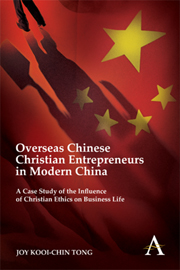 Overseas Chinese Christian Entrepreneurs in Modern China
Overseas Chinese Christian Entrepreneurs in Modern China Book contents
- Frontmatter
- Contents
- Acknowledgments
- List of Tables and Figures
- Chapter 1 Introduction: Studying Christian Ethics and Business Life in Post-1978 China
- Chapter 2 Religion and Economic Life: The Protestant Ethic and Max Weber's Legacy
- Chapter 3 Overseas Chinese Christian Entrepreneurs in Post-1978 China (Shanghai): Business, Faith and Ethics
- Chapter 4 Religious Motivation and Entrepreneurial Spirit
- Chapter 5 Business–Faith Integration: Three Types of Christian-Based Companies
- Chapter 6 Communities of Faith: Fellowships for Overseas Chinese Christian Businesspeople in Shanghai
- Chapter 7 Female Entrepreneurs: Four Stories
- Chapter 8 Conclusion and Research Implications
- Bibliography
- Index
Chapter 2 - Religion and Economic Life: The Protestant Ethic and Max Weber's Legacy
Published online by Cambridge University Press: 05 May 2012
- Frontmatter
- Contents
- Acknowledgments
- List of Tables and Figures
- Chapter 1 Introduction: Studying Christian Ethics and Business Life in Post-1978 China
- Chapter 2 Religion and Economic Life: The Protestant Ethic and Max Weber's Legacy
- Chapter 3 Overseas Chinese Christian Entrepreneurs in Post-1978 China (Shanghai): Business, Faith and Ethics
- Chapter 4 Religious Motivation and Entrepreneurial Spirit
- Chapter 5 Business–Faith Integration: Three Types of Christian-Based Companies
- Chapter 6 Communities of Faith: Fellowships for Overseas Chinese Christian Businesspeople in Shanghai
- Chapter 7 Female Entrepreneurs: Four Stories
- Chapter 8 Conclusion and Research Implications
- Bibliography
- Index
Summary
This study is about how religion and, in particular, Christianity, is influencing both the economic practices and the orientations of Overseas Chinese Christian entrepreneurs in China. The topic and primary focus of this study clearly pay tribute to Max Weber's work on the economic ethics of world religions in general and The Protestant Ethic in particular.
The main concern of the study is not to test or apply Weber's thesis concerning Protestantism and the rise of the spirit of capitalism to China. Nor does it aim to confirm or refute Weber's argument on Confucianism or to search for any equivalent or a Chinese religious ethic analogous to Weber's type case in modern China. The main purpose of this research is instead to apply Weber's motivational approach, that is, to explore the consequences of religious motivations in the realm of economic activity in a study of the Christian ethics of Overseas Chinese Christian entrepreneurs in China. This research is an investigation of the importance of religious values and commitments to gain an understanding of economic actions. Such an approach is rare as most research on Weber and Chinese society is either concerned with refuting or refining the Weberian thesis on Confucianism and China or with searching for equivalents for the Protestant ethic in China. This typical approach has been important in calling attention to the role of Asian religions, especially Confucianism, in promoting economic development in East Asia.
- Type
- Chapter
- Information
- Overseas Chinese Christian Entrepreneurs in Modern ChinaA Case Study of the Influence of Christian Ethics on Business Life, pp. 33 - 52Publisher: Anthem PressPrint publication year: 2012


